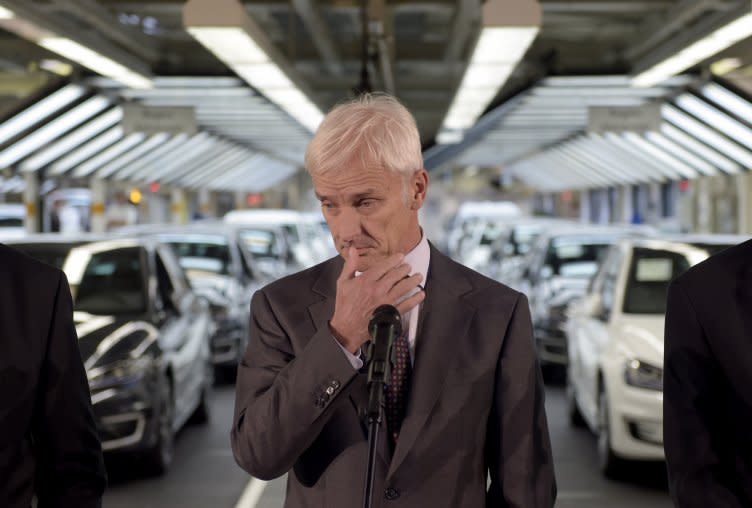Why Volkswagen Cheated

New Volkswagen CEO Matthias Müller has to explain how and why Volkswagen cheated, and change the deeply entrenched corporate culture.Odd Andersen/AFP/Getty
On December 10, Volkswagen Chairman Hans-Dieter Pötsch made a public admission: A group of the company’s engineers decided to cheat on emissions tests in 2005 because they couldn’t find a technical solution within the company’s “time frame and budget” to build diesel engines that would meet U.S. emissions standards. When the engineers did find a solution, he said, they chose to keep on cheating, rather than employ it. “We are not talking about a one-off mistake, but a whole chain of mistakes that was told U.S. lawmakers in sworn testimony: “This was a couple of software engineers who put this in, for whatever reason.” He then said that three engineers were involved. Then he said he did not know the exact number. He added, “To my understanding, this was not a corporate decision.”
Newsweek has learned that Volkswagen engineers and technicians tried to alert superiors about the emissions-rigging activities as far back as 2011 but were ignored. “We have had several complaints about people saying they tried to warn the company about this, which is being checked by our external investigator,” Volkswagen’s head of external and investor relations, Hans-Gerd Bode, tells Newsweek. Volkswagen’s external investigator, law firm Jones Day, which is overseeing an internal probe at the company, declined to comment.

Some Volkswagen workers told supervisors about the cheating in 2011, but were ignored; about 50 employees have admitted they knew something about the deception.Michael Loewa/laif/Redux
About 50 Volkswagen employees—mostly based in Wolfsburg—have confessed they had knowledge of activities related to the emissions scandal as part of Volkswagen’s warned Volkswagen in 2007 not to use the offending software in real-world driving conditions, which could be illegal, according to the German newspaper Bild Am Sonntag, citing an internal communication it obtained between the two companies.
But the ease with which VW’s engineers could have perpetrated the deception doesn’t explain why they did it. Engineers at any car company could have done the same thing. So why Volkswagen?
People familiar with the company tell Newsweek that the unique corporate culture of Volkswagen, inextricable from its headquarters in Wolfsburg—one of Germany’s richest cities—led to an environment in which employees live and work under a highly centralized hierarchy that expects them to perform, no matter what the demands. “Volkswagen is completely different from the other automakers,” says Ferdinand Dudenhöffer, director of the Center for Automotive Research at the University of Duisburg-Essen in Germany. “It’s not democratic; it’s autocratic. It’s a system focused on its roots and Wolfsburg. It’s not at all global in its thinking.”’

A cyclist rides past the Volkswagen plant in Wolfsburg, Germany on September 23.Julian Stratenschulte/EPA
Volkswagen’s top brass may never have directly instructed employees to install the cheat software, Dudenhöffer says, but the company’s work environment is well known for eschewing debate and dissent. “Sometimes you can do things without explicitly ordering them,” he says. “At Volkswagen, the management might say, ‘Please think again on that, and if you don’t find a solution, we may need to find another engineer.’ You may find yourself in a situation where, if you want to keep your job, you have no escape.”
Another reason many of Volkswagen’s employees may have remained quiet about the emissions-cheating issue for so long—even if they didn’t want to—says one Volkswagen executive, is the company’s bonus system, which is unusually generous to all employees, from the assembly line to the CEO, and rewards consensus. Volkswagen pays bonuses not only for individual performance and company performance but also goes the extra step of rewarding team performance, he says, which creates financial incentive not to offer dissenting opinions. “Even assembly line workers get a bonus, but the higher up you go in the company, the higher the percentage of your remuneration is from your bonus,” says the executive, who asked not to be named because he still works for the company.
In a letter to employees in September, Volkswagen’s labor leader, Bernd Osterloh, acknowledged that the company needed to change its workplace culture and create “a climate in which problems aren’t hidden but can be openly communicated to superiors, [and where] it’s possible and permissible to argue with your superior about the best way to go.”
The scandal is likely to change Volkswagen’s culture and approach to doing business in numerous ways. It has also altered the way environmental regulators around the world go about their work. The crisis has shown many regulators how to spot cheat code, something many of them did not know how to do before, Grundler says. “This matter has taught us a lot,” he tells Newsweek. “We know how to look for these types of defeat devices now. We no longer have to go through the haystack to find the needle.”
Related Articles

 Yahoo News
Yahoo News 
